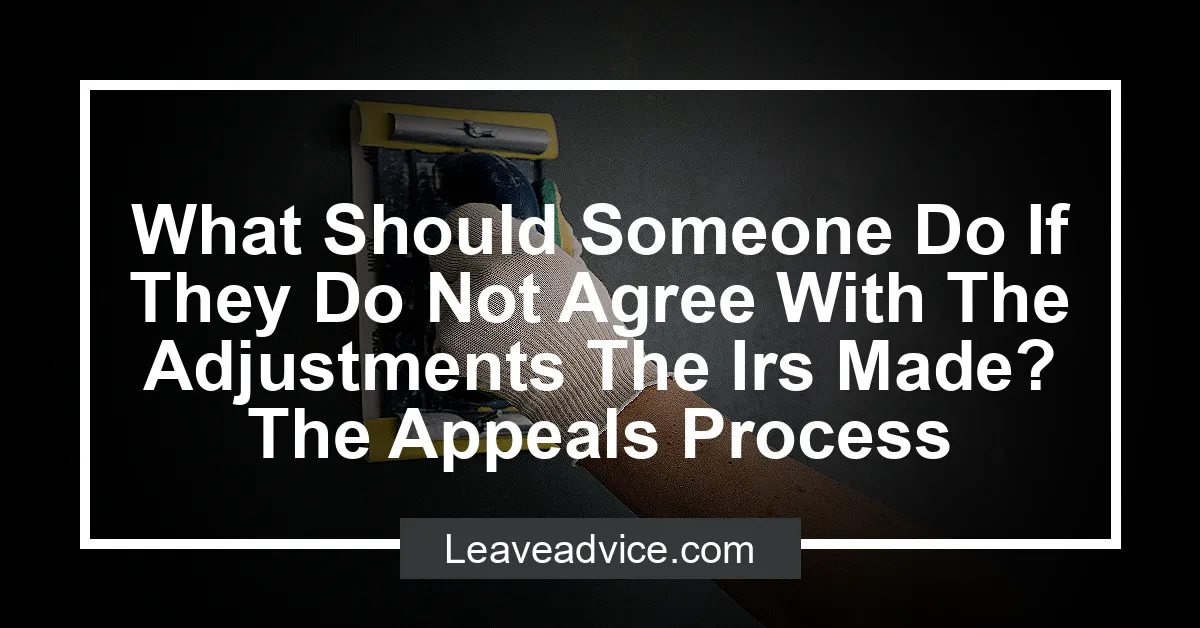What Should Someone Do If They Do Not Agree With The Adjustments The Irs Made? The Appeals Process


If you do not agree with the adjustments the IRS made, you can request an appeal by filing a written protest. The protest should be completed and mailed to the IRS address provided in the letter explaining your appeal rights.
The appeals process is available for individuals who believe that the IRS made an incorrect decision based on a misinterpretation of the law.
Check out this Youtube video: “What should someone do if they do not agree with the adjustments the IRS made?” to learn how to effectively write a tax protest letter and contest any issues you may have with the IRS.
Understanding IRS Adjustments
Definition of IRS adjustments
An IRS adjustment refers to any change made by the IRS to a taxpayer’s return. These changes can affect the amount of tax owed, refund amount, or both.
They are made when the IRS identifies a discrepancy or error in the taxpayer’s return, leading to the need for an adjustment.
Common reasons for IRS adjustments
Common reasons for IRS adjustments include discrepancies in reported income, failure to report certain income sources, errors in claiming deductions or credits, and mismatched information with what the IRS has on file. Other reasons may include mathematical errors, failure to file required forms, or misinterpretation of tax laws.
Reviewing IRS Adjustment Notice
Explanation of the IRS adjustment notice
If you’ve received an IRS adjustment notice, don’t panic. This notice may reference changes to your tax account, taxes owed, or specific issues on your tax return.
It’s important to carefully read the notice to understand the nature of the adjustments made by the IRS.
Understanding the changes made by the IRS
When reviewing the notice, pay close attention to the changes made by the IRS. Identify the specific adjustments that have been made to your tax account or tax return.
It’s crucial to understand the basis for these changes and how they may impact your tax liability.
Requesting an Explanation
To request an explanation from the IRS, individuals should carefully review the letter or notice received from the IRS. Then, they should follow the instructions provided in the notice to address the issue.
If there is any disagreement with the adjustments made by the IRS, individuals should take the following steps to request an explanation:
-
Read the letter carefully: Understand the reason for the contact and follow the specific instructions provided.
-
Review the information: Compare the information in the letter with the original return or relevant documentation.
-
Take any requested action: If any specific action is requested, such as making a payment or providing additional information, it should be taken promptly.
-
Prepare a Request for Appeals: If the individual disagrees with the adjustments, they can prepare a brief written statement requesting an appeals conference and stating the reasons for their disagreement.
It’s important to follow the IRS’s guidelines precisely when requesting an explanation to ensure that the matter is resolved effectively.
Gathering Supporting Documents
The importance of gathering supporting documents lies in providing concrete evidence to support your position when contesting adjustments made by the IRS. These documents are crucial in strengthening your case and demonstrating the validity of your claims.
Examples of documents to support your position
| Document | Importance |
|---|---|
| Tax returns | Evidence of income and deductions for the year in question |
| Bank statements | Proof of financial transactions and account activities during the relevant period |
| Receipts and invoices | Documentation of expenses and purchases claimed |
| Correspondence with the IRS | Records of communication or disputes with the IRS |
Gathering these documents provides a comprehensive foundation for challenging the IRS adjustments and can substantially bolster your case.
Consulting a Tax Professional
Benefits of consulting a tax professional
Consulting a tax professional can help individuals navigate complex tax laws, maximize deductions, and minimize tax liabilities. Additionally, they provide valuable assistance in tax planning and can help avoid potential penalties from inaccurate filings.
Finding the right tax professional for your situation
When looking for a tax professional, it’s crucial to consider their expertise in handling your specific tax situation. Seek referrals from your network, confirm the professional’s credentials, and conduct an interview to ensure they understand your unique tax preparation needs.
Responding to the IRS
How to respond to the IRS adjustments
If you do not agree with the adjustments the IRS made, the first step is to complete your protest and mail it to the IRS address on the letter explaining your appeal rights. Make sure not to send your protest directly to the IRS.
To respond to the IRS adjustments, gather any supporting documents and draft a response letter outlining your disagreement with the adjustments. Be sure to enclose a copy of the IRS notice and mail your reply to the address shown in the letter, along with the bottom tear-off portion of the letter if provided. Keep copies of any correspondence with your tax records.
Examples of response letters or forms
| Sample Response Letter or Form |
|---|
| Enclose a copy of the IRS notice. Make a copy of the notice you received and include it with your letter. In the first paragraph of your letter, explain why you disagree with the IRS adjustments. |
Initiating the Appeals Process
To initiate the appeals process, the individual must first file a Notice of Appeal, signaling their disagreement with the IRS adjustment. Following this, they need to pay the filing fee to formalize the appeal.
It’s essential to determine if any additional information must be provided to the appeals court during this stage.
Steps to initiate the appeals process
- File the Notice of Appeal.
- Pay the filing fee.
- Determine if/when additional information must be provided to the appeals court.
Understanding the timeline for filing an appeal
Understanding the timeline for filing an appeal is crucial. Typically, individuals have a limited window to initiate the process, so prompt action is necessary.
They should be aware of the specific deadlines and timeframes associated with each step in the appeals process.
| Appeal Process Step | Timeline |
|---|---|
| File the Notice of Appeal | Within specified timeframe |
| Pay the filing fee | Within specified timeframe |
| Additional information provision | As required by the appeals court |
Presenting Your Case
When presenting your case to the IRS Appeals Office, it’s crucial to be well-prepared and organized. Ensure that your protest is complete and mailed to the IRS address specified in the letter explaining your appeal rights.
This simple step ensures that your protest reaches the right department for review.
Tips for presenting your case to the IRS Appeals Office
-
Strive to make the job of the Appeals officer easier. By providing a comprehensive legal analysis highlighting the strengths of your arguments, you make it simpler for the IRS Appeals Office to consider and review your case thoroughly.
-
Focus on presenting a strong legal analysis that showcases the weaknesses of the government’s position in contrast to the minimal weaknesses in your own arguments. This approach helps in strengthening your case and presenting compelling reasons for the IRS Appeals Office to reconsider their decision.
Providing evidence to support your position
| Key Elements | Details |
|---|---|
| List of Disputed Issues | Provide a comprehensive list of all disputed issues, tax periods or years involved, proposed changes, and reasons for disagreement with each issue. |
| Supporting Facts | Share specific facts supporting your position on each disputed issue, ensuring that they are well-organized and presented clearly. |
| Legal Explanation | Include relevant law or authority supporting your position on each disputed issue, enhancing the strength of your arguments for the IRS Appeals Office to consider. |
Reviewing Appeal Decision
When someone does not agree with the adjustments made by the IRS, reviewing the appeal decision becomes crucial. Understanding the appeal decision is the first step in this process.
Options available after the appeal decision will determine the course of action for the individual. This may include further appeals or seeking legal counsel.
Factors to Consider When Deciding to Appeal a Case
-
Time Constraints (The Deadline)
-
Legal Grounds for Appeal
-
The Cost of the Appeals Process
Filing a Petition in Tax Court
Steps to file a petition in Tax Court
To file a petition in Tax Court, the petitioner can either file a paper petition by mail or in person, or they can file an electronic petition through the Court’s DAWSON system. The Court must receive the electronically filed petition before 11:59 pm Eastern Time on the last date to file.
The petitioner should pay close attention to any specific deadlines provided by the IRS regarding the due date for filing the petition.
Considerations before filing a petition
Before filing a petition in Tax Court, it is crucial to consider the specific type of petition being filed, such as a notice of deficiency, notice of determination, or notice of certification. Additionally, it’s important to note that different types of petitions have different deadlines for filing, and the total amount of relief sought should not exceed $50,000 in certain cases such as a request for spousal relief.
The Role of Legal Representation
In the scenario where someone does not agree with the adjustments the IRS has made, the role of legal representation becomes pivotal. Legal representation in Tax Court is of utmost importance as it provides the individual with expert guidance and advocacy to navigate the complex procedures and regulations of tax law, ensuring a fair resolution to the dispute.
Importance of legal representation in Tax Court
Legal representation in Tax Court is critical as it allows individuals to have a knowledgeable professional who can effectively present their case and protect their rights. Tax law is intricate and having skilled legal representation increases the likelihood of a favorable outcome, providing peace of mind during the challenging process.
Finding the right attorney for Tax Court proceedings
When seeking legal representation for Tax Court proceedings, it is imperative to find an attorney with extensive experience in tax law and a proven track record of success in handling similar cases. Additionally, ensuring the attorney is licensed to practice law in the relevant jurisdiction and has specialized expertise in tax law is essential.
Comparing the qualifications and experience of different attorneys can help in finding the right legal advocate to represent one’s case effectively.
| Considerations for Finding the Right Attorney |
|---|
| Extensive Experience in Tax Law |
| Proven Track Record of Success |
| Licensed to Practice in Relevant Jurisdiction |
| Specialized Expertise in Tax Law |
Negotiating with the IRS
To negotiate with the IRS, consider setting up a payment plan through an installment agreement, allowing you to address back tax payments and avoid significant costs.
Options for negotiating with the IRS
- Installment Agreement: Offers a structured payment plan to settle tax debts gradually, reducing financial strain.
- Online Payment Agreement: Provides a convenient platform to manage tax payments efficiently.
- Delaying Collection: Temporarily suspends collection activities, offering a brief relief period.
- Offer in Compromise: Allows taxpayers to settle their tax liability for less than the full amount owed.
Examples of successful negotiation strategies
- Be Prepared: Gather all relevant documentation and information before engaging in negotiations with the IRS.
- Stay Positive: Approach negotiations with a positive mindset and be persistent in advocating for a favorable resolution.
- Effective Communication: Maintain open and clear lines of communication with the IRS, promptly responding to notices and requests.
- Research and Preparation: Anticipate the IRS’s position, present compelling arguments, and have essential facts readily available.
| Negotiation Techniques | Description |
|---|---|
| Research and Preparation | Conduct thorough research on the IRS and initiate conversations with well-prepared counterarguments. |
| Effective Communication | Establish clear and open lines of communication with the IRS by responding promptly to all inquiries. |
| Persistence and Positivity | Demonstrate persistence and a positive attitude throughout the negotiation process, striving for a favorable outcome. |
Considering Alternative Dispute Resolution
In the case where someone does not agree with IRS adjustments, alternative dispute resolution (ADR) options can be explored. ADR methods include arbitration, mediation, negotiated rulemaking, and neutral factfinding, aiming to provide a forum for voluntary, consensual agreement between parties.
Explanation of alternative dispute resolution options
One option is arbitration, where a neutral arbitrator hears arguments and evidence from each side and then decides the dispute’s outcome. Another method is mediation, where a neutral third party facilitates discussions to help parties reach a mutually acceptable resolution.
Negotiated rulemaking involves stakeholders collaborating to reach a consensus on new regulations.
Benefits of exploring alternative methods for resolving disagreements
Exploring ADR provides several benefits, such as flexibility, cost-efficiency, time-effectiveness, and giving the parties more control over the process and results. ADR also leads to speedier resolution, limits hostility between parties, and is usually less expensive than traditional litigation.
Furthermore, it offers the opportunity to resolve disputes in a private and confidential manner, promoting a quicker return to regular business operations.
| ADR Method | Description | Benefits |
|---|---|---|
| Arbitration | Neutral arbitrator decides the dispute’s outcome after hearing arguments and evidence. | Speedier resolution, cost-effectiveness, private and confidential resolution. |
| Mediation | Involves a neutral third party facilitating discussions to help parties reach a mutually acceptable resolution. | Limits hostility between parties, cost-efficiency, time-effectiveness. |
| Negotiated Rulemaking | Stakeholders collaborate to reach a consensus on new regulations through negotiations. | Flexibility, more control over the process and results, quicker return to regular business operations. |
| Neutral Factfinding | Neutral factfinder assists parties in reaching a resolution by investigating and identifying key issues in the dispute. | Rapid resolution, private and confidential manner, less expensive than traditional litigation. |
| Minitrials | Parties present condensed versions of their cases to a neutral advisor who provides an evaluation, helping parties assess their positions and potential outcomes. | Opportunity for private and confidential dispute resolution, speedier resolution, and cost-efficiency. |
Seeking Congressional Assistance
In cases of disagreement with IRS adjustments, exploring the option of seeking Congressional assistance can be a crucial step. When understanding the role of Congress in IRS matters, it’s essential to note that Congress has oversight of the IRS and can aid in investigating and resolving taxpayer issues.
When seeking Congressional assistance, it’s important to submit a signed privacy waiver and relevant documentation to the congressional office representing the taxpayer’s district. Once the request is initiated, the Congressional liaison responsible for handling inquiries from Congress members will engage with the federal agency to address the concerns raised by the taxpayer.
It is vital to ensure that all administrative options have been exhausted before reaching out for Congressional assistance. Initiating this process involves identifying the local representative based on the taxpayer’s geographical location and their district.
In cases of disagreement with IRS adjustments, engaging Congress in resolving taxpayer issues can provide an additional avenue for addressing concerns beyond the administrative options available internally or through the IRS.
| Congress Role in IRS Matters |
|---|
| Oversight of the IRS |
| Aid in investigating taxpayer issues |
Seeking Relief in Extreme Circumstances
Reviewing options for seeking relief in extreme circumstances
When someone disagrees with the adjustments made by the IRS, seeking relief in extreme circumstances can be the next step. This involves reviewing various options available to address the disagreement and alleviate the potential financial impact.
Examples of extreme circumstances and their impact on IRS adjustments
Extreme circumstances that may warrant seeking relief from IRS adjustments include demonstrated financial hardship, unemployment, severe illness, or a significant loss of income. These situations can have a profound impact on an individual’s ability to meet tax obligations.
In such cases, it’s crucial to explore relief options and potential resolutions.
| Extreme Circumstance | Impact on IRS Adjustments |
|---|---|
| Demonstrated Financial Hardship | Makes it impossible or extremely difficult to pay tax debt |
| Unemployment | Significantly reduces income, affecting tax obligations |
| Severe Illness | Creates financial strain, impacting the ability to fulfill tax responsibilities |
| Significant Loss of Income | Hinders the capacity to meet tax payment requirements |
Recommended Amazon Products for Handling IRS Adjustments
Here’s a curated list of products that can help you handle IRS adjustments with ease. These recommendations are based on their functionality and reviews.
Ring Video Doorbell


The Ring Video Doorbell is recommended for enhancing home security, especially when dealing with important documents and sensitive financial matters. Its functionality in providing real-time alerts and allowing you to see, hear, and speak to visitors from your phone, tablet, or PC makes it an ideal tool for monitoring your surroundings.
| Pros | Cons |
|---|---|
| Easy installation | Requires a subscription for extended features |
| Good video quality | Some connectivity issues reported |
| Two-way audio | Motion detection sensitivity may need adjustment |
Fujitsu ScanSnap iX1500 Color Duplex Document Scanner


The Fujitsu ScanSnap iX1500 is recommended for digitizing and organizing important documents, receipts, and statements for tax and financial purposes. Its high-speed scanning capability and seamless integration with various cloud services make it a valuable tool for managing paperwork and keeping records organized.
| Pros | Cons |
|---|---|
| Efficient scanning process | Relatively high initial cost |
| Wireless connectivity | Occasional software compatibility issues |
| Automatic document feeding | Limited to document scanning |
TurboTax Deluxe Tax Software


TurboTax Deluxe is recommended for accurately preparing and filing taxes, especially when addressing IRS adjustments. Its intuitive interface, step-by-step guidance, and error checking features help ensure that your tax return is thorough and compliant with the latest tax laws.
| Pros | Cons |
|---|---|
| User-friendly interface | Higher priced compared to other versions |
| Comprehensive guidance | Some users prefer a live expert assistance option |
| Accurate calculations | Not suitable for complex business taxes |
Top Recommended Product for Handling IRS Adjustments
If you’re looking for the best solution for dealing with IRS adjustments, we highly recommend the Ring Video Doorbell (https://www.amazon.com/s?k=ring+video+doorbell). This product not only enhances home security but also provides peace of mind when addressing important financial matters. Ready to improve your approach to handling IRS adjustments? Check out the Ring Video Doorbell today for the best results!


Conclusion
The impact of social media on mental health can be both positive and negative. It can provide a platform for connection and support, but it can also contribute to feelings of inadequacy and isolation.
Furthermore, while social media can be a valuable tool for information sharing and community building, it is important to be mindful of its potential negative effects, such as cyberbullying and misinformation.
It is important for individuals to use social media responsibly, set healthy boundaries, and seek support when needed to maintain positive mental well-being in the digital age.


















